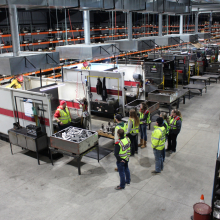2022 Business Benchmarks report: Innovation
Innovation in Minnesota
Featuring:
Chris Landon, Senior Vice President, Philips

Innovation helps define Minnesota’s business legacy. In the last few years – and throughout the COVID-19 pandemic – businesses operating in Minnesota have fueled that legacy in many areas, including health care.
During COVID, Philips invested over $100 million in the production ramp-up of acute care solutions to diagnose, treat, manage and monitor COVID-19 patients. During shutdowns, there were fewer planes, ships and trucks available to transport critical supplies to where they were needed. Philips partnered with KLM Airlines to start an air bridge to ensure that parts for these lifesaving devices could get where they needed to go.
According to Chris Landon, Senior Vice President and General Manager at Philips, dispatching 90% of their workforce to remote work allowed them to “deliver at a much better scale, safely and conveniently at a much lower cost to our customers, and I think fundamentally shifts how we deliver clinical training in the future.
”Philips is a trusted, world-leading health technology company that has expanded its product offerings and workforce in Minnesota by acquiring several companies over the last few years. They now employ 400 people and have offices in Maple Grove, Plymouth, Eagan and Minneapolis. Their Minnesota operations focus on providing airway clearance solutions for patients with chronic respiratory conditions, manufacturing of medical devices for minimally-invasive cardiovascular procedures and developing cloud-based population health management software solutions.
“Philips is proud to be part of Minnesota’s world-class health care ecosystem,” says Landon. When considering what benefits there are to doing business in Minnesota, he says, “Being part of this community helps with innovation, talent attraction and collaboration with academic medical centers and universities.” In 2020, Philips opened an “innovation lab” across the street from the Mayo Clinic in Rochester.

They also cite the strong pool of talent produced by Minnesota’s universities, when faced by similar workforce challenges as most companies are experiencing at this point in COVID-19 recovery. “We are fortunate that there is such a strong pool of talent in this state,” says Landon. Innovating is an approach to finding workers, as well. “With a large pool of industries and a strong university system, we can attract excellent employees. Because the state has a strong concentration of medical technology companies, innovators and academia, it fits well into our ecosystem approach Minnesota is a good location for Philips.”
As for the future, the folks at Philips plan to keep providing new and innovative technologies that help Minnesota be an attractive place to do business and live a healthy life. They are working on new maternal health solutions to improve outcomes, increase engagement and member experience, while lowering costs. One of these solutions, an app called Pregnancy+, is already the world’s number one downloaded pregnancy app. It helps expecting mothers track their pregnancy progress. And Philips Lumify, a mobile ultrasound tool, helps high-risk moms connect with providers quickly and bring care into a home or rural clinic.
Innovation in Minnesota: A perennial bright spot
Minnesota’s legacy of business innovation was on display throughout the COVID-19 pandemic. Businesses pivoted to meet shifting demand, changing supply chains and government-imposed shut downs. Minnesota ranks first for the five-year business survival rate, and even though entrepreneurship activity is slightly better than previous years, startup challenges remain. This is especially true for immigrants and entrepreneurs of color. According to the Minnesota Chamber’s report, “The Economic Contributions of Immigrants to Minnesota,” there are 18,000 entrepreneurial immigrants in the state, and they play an increasingly important role in the economy through job creation, innovation and GDP growth. Challenges can be both needs-based and opportunity-based and include access to capital and time to acquire business knowledge to start a company.











